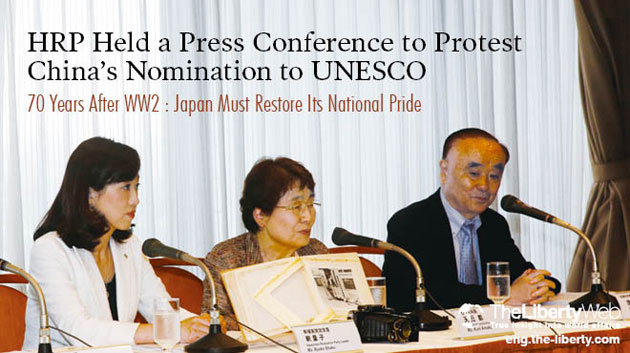HRP Held a Press Conference to Protest China’s Nomination to UNESCO
70 Years After WW2: Japan Must Restore Its National Pride
See the press conference here.
In May, Japan asked UNESCO to add “Battleship Island” and other historical sites to its world heritage list. China and South Korea met this request with protests that drew international media attention. Now there is another battle that Japan must fight over UNESCO’s historical record.
In June of 2014, China announced that its latest UNESCO application: sets of documents relating to the Nanjing Massacre and the issue of the so-called “comfort women” for addition to the Memory of the World Register.
Yet, most Japanese haven’t even heard of the details of the application, much less that the Japanese government has taken some concrete steps to protest China’s application.
The Happiness Realization Party (HRP) held a press conference in Tokyo on May 10th to criticize China’s move. Kuni Amako, an 80 year old OB/GYN doctor from Fukuoka City, told the media that the contents of the documents China submitted were false. The Party leader, Ryoko Shaku, and the critic, Hiromichi Moteki, also attended the press conference.
Her objection focused on one of the photographs that China submitted as proof of the practice of forcibly drafting women into military brothels. In the photo, a Japanese soldier and a woman were standing in front of a brothel. The document submitted to UNESCO says that the State Archives Administration of China owns the copyright of this picture.
However, Tetsuo Aso (who passed away) actually snapped the photo, and it now belongs to his daughter, Kuni Amako. She is still in possession of the negative.
Mr. Aso was sent to China as a medical officer during WW2. One of his jobs was to visit the comfort stations or wartime brothels in China to prevent sexually transmitted diseases. Of course, the women who worked in the comfort stations were ordinary prostitutes, not women that the Japanese Army took by force and turned into sex slaves.
During Mr. Aso’s work, he often took pictures of the local areas, and the picture that China submitted was one of them. The Chinese have used Amako’s father’s belongings without her permission, and worse, they’ve been exploiting that material to attack Japan.
At the conference, Amako emphasized that she did not give the Chinese permission to use her father’s photograph. Amid the controversy over the issue of the comfort women, her father has also been treated like a perpetrator. She expressed resentment, saying, “I hope the time will come when the truth prevails.”
In response, the leader of HRP, Ryoko Shaku, called for UNESCO to reject the registration of the documents, saying, “Who should be held responsible if China’s application gets accepted? Would Prime Minister Abe be to blame? I hope more Japanese people consider it their own responsibility and stand up.”
Last year, HRP launched a nationwide campaign to collect signatures urging Prime Minister Abe to demand that UNESCO dismiss China’s application. On April 2nd, the party submitted 192,032 signatures and petitioned the Cabinet Office.
On May 26th, the party leader, Shaku, visited UNESCO’s headquarters in Paris to submit a report that verified the documents China had submitted, as historical evidence, had actually been fabricated. She demanded that UNESCO turn down China’s application.
45 Japanese and overseas intellectuals expressed their support for HRP’s movement and signed the report. Among them were Shoichi Watanabe, a professor emeritus at Sophia University, the economic analyst, Keitaro Hasegawa, the critic, Bunyu Ko, and the social critic, Tony Marano, to name a few.



















